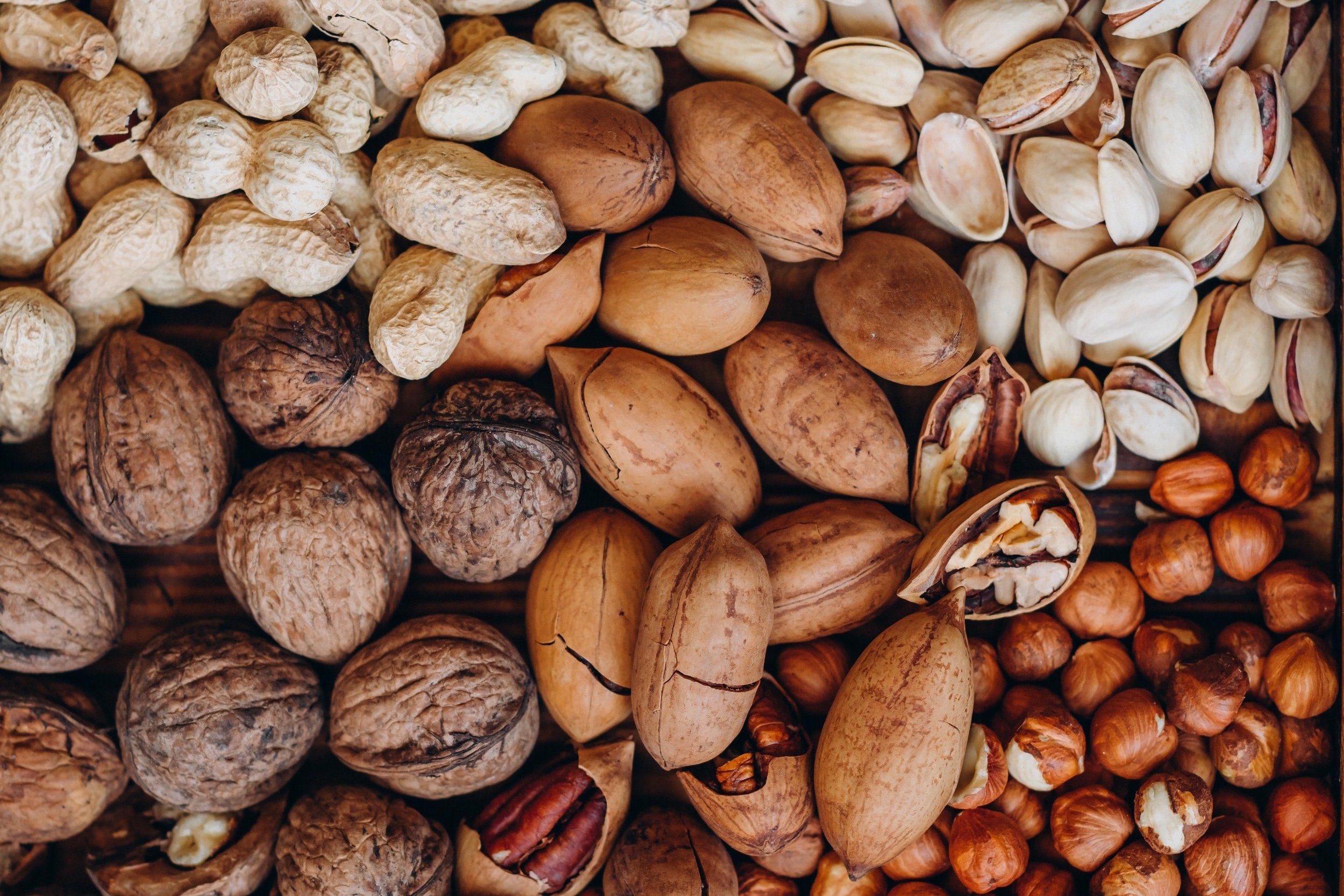
Minerals
The essential minerals needed in the diet include calcium, phosphorous, magnesium, iron, iodine, zinc, copper, chromium, selenium, manganese, and molybdenum. These minerals are considered micronutrients, so they are only needed in small amounts in the diet. Even though this is the case, having them in the diet is imperative due to the body being uncapable of synthesizing them. Minerals can be further categorized into major, trace, and ultra-trace minerals. Major minerals are needed in the diet in amounts greater than 100 mg per day while trace and ultra-trace minerals are needed in the diet in amount less than 100 mg per day. Of the major minerals, calcium is the most abundant mineral in the body, accounting for 1.5-2% of a person’s total body weight (1)! These minerals have potent effects in the body, including the following:
- Cellular repair, integrity, and differentiation (2)
- Maintaining proper enzymatic function (3)
- Aiding in metabolic pathways (4)
- Bone formation, growth, and strength (5)
- DNA/RNA synthesis and gene expression (6)
- Hormone synthesis (7)
- Regulating normal neurological functions (8)
- Boosting the immune system (9)
The list of the various roles that minerals have in the body can go on and on, but this list highlights the major roles of the minerals. Luckily enough, minerals are found in all sorts of food sources, so consuming the adequate amounts of each mineral is fairly easy to accomplish. The following table describes the primary sources of the essential minerals in detail (1).
Calcium
Dairy
Seafood (fish with bones)
Almonds
Collards
Spinach
Broccoli
Fortified foods
Iron
Meat like beef, pork, and chicken
Seafood
Enriched cereals & breads
Legumes
Spinach
Kale
Potatoes with skin
Magnesium
Wheat bran
Beans
Legumes
Nuts & seeds
Broccoli
Okra
Spinach
Chives
Zinc
Red meats
Poultry
Pork
Seafood
Dairy
Whole grains
Vegetables
Iodine
Salt
Seafood
Phosphorous
Meat
Milk
Whole grains
Chromium
Processed and organ meats
Whole grains
Peanuts
Cheese
Mushrooms
Some fruits and vegetables
Copper
Shellfish
Nuts
Legumes
Bran & germ of whole grains
Manganese
Small amounts in food
Selenium
Dependent upon soil for plants and diet for animals
Molybdenum
Meat
Poultry
Fish
Grains
Legumes
Milk
Written by: Siri Pederson
Last edited: 05/11/2022
-
Gropper SS, Smith JL, Carr TP. Advanced Nutrition and Human Metabolism. 8th ed.; 2021.
Wang S, Duan C, Liu H, et al. The roles of selenium, insulin-like growth factor binding protein 2 and suppressor of cytokine signaling 3 in the pathogenesis of Kashin–Beck disease. Biomarkers. 2016;21(5):409-415. doi:10.3109/1354750X.2016.1141990
Taniguchi M, Fukunaka A, Hagihara M, et al. Essential Role of the Zinc Transporter ZIP9/SLC39A9 in Regulating the Activations of Akt and Erk in B-Cell Receptor Signaling Pathway in DT40 Cells. PLoS ONE. 2013;8(3). doi:10.1371/journal.pone.0058022
Rouault TA. The indispensable role of mammalian iron sulfur proteins in function and regulation of multiple diverse metabolic pathways. BioMetals. Published online 2019. doi:10.1007/s10534-019-00191-7
Zhang J, Sun L, Luo X, et al. Cells responding to surface structure of calcium phosphate ceramics for bone regeneration. Journal of Tissue Engineering and Regenerative Medicine. 2017;11(11):3273-3283. doi:10.1002/term.2236
Keravis T, Lugnier C. Cyclic nucleotide phosphodiesterase (PDE) isozymes as targets of the intracellular signalling network: Benefits of PDE inhibitors in various diseases and perspectives for future therapeutic developments. British Journal of Pharmacology. 2012;165(5):1288-1305. doi:10.1111/j.1476-5381.2011.01729.x
Nerhus I, Odland M, Kjellevold M, et al. Iodine status in Norwegian preschool children and associations with dietary iodine sources: the FINS-KIDS study. European Journal of Nutrition. 2019;58(6):2219-2227. doi:10.1007/s00394-018-1768-0
Kirkland AE, Sarlo GL, Holton KF. The role of magnesium in neurological disorders. Nutrients. 2018;10(6). doi:10.3390/nu10060730
Wintergerst ES, Maggini S, Hornig DH. Contribution of selected vitamins and trace elements to immune function. Annals of Nutrition and Metabolism. 2007;51(4):301-323. doi:10.1159/000107673

















